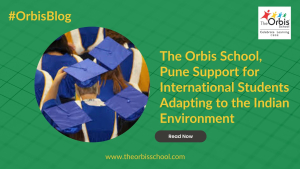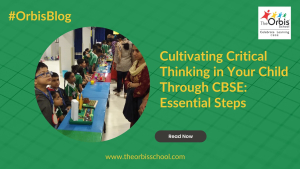Super User
The Orbis School, Pune Support for International Students Adapting to the Indian Environment
The Orbis School, Pune Support for International Students Adapting to the Indian Environment
(A) Explanation of the growing trend of international students seeking education in India:
In today’s rapid progress of the world, the significance of International Education and the change of environment for a student cannot be overemphasized. Higher education has become increasingly internationalised, with students from different countries seeking education opportunities abroad. India is one of the popular destinations for international students pursuing higher education, due to its affordable tuition, first-class education, and cultural diversity. Apart from providing education to foreign students, India has now opened various platforms for training and internship programs. It is specially designed to help them gain experience in their respective field of learning.
(B) Understanding the needs of International students:
They can face several challenges, including language barriers, social and cultural differences, financial help, and adjusting to a new environment. There are many opportunities to learn the local language by joining a part-time class available in an online/offline mode. Adapting to an unfamiliar environment including course requirements, grading systems, and classroom culture. International students may face issues of budget for their basic needs like food, travel, renting an apartment, etc. Scholarships are one of the easiest ways to help them release their financial burdens, but students will need to manage their finances without relying on them. Also, they need to establish social networks to overcome the unfamiliarisation of social and cultural norms. Building a community with good and supportive people who would help them create a sense of belonging would grant relief.
Orbis School’s cultural integration programs are meticulously designed to foster an inclusive environment where diversity is celebrated and embraced. Through a myriad of initiatives, such as cultural exchange events, language immersion programs, and cross-cultural workshops. Orbis School creates opportunities for students to engage with and learn from people of different backgrounds. These programs not only enhance cultural awareness but also promote empathy, understanding, and respect for others' perspectives and traditions. By encouraging students to step out of their comfort zones and interact with peers from diverse cultural backgrounds. Orbis School’s commitment to cultural integration goes beyond the classroom, creating a vibrant community where every individual feels valued and empowered to contribute positively to society.
(C) Academic support services:
Orbis School follows the CBSE curriculum with a progressive outlook, ensuring that students receive a well-rounded education that evolves with the times. The emphasis on experiential learning is particularly commendable, as it allows students to not only grasp the “what’s” and “how’s” of concepts but also understand the “why’s” behind them. This approach fosters critical thinking and problem-solving skills, empowering students to seek out their answers and take ownership of their learning journey. Moreover, the school’s focus on subjects like Robotics, Coding, and Artificial Intelligence goes beyond the traditional curriculum, preparing
students for the demands of the modern world. By exposing them to emerging technologies and interdisciplinary fields, they get equipped with valuable skills that are increasingly relevant in today’s job market. Through the use of worksheets, audiovisuals, and activity-based learning modalities, the school ensures that every student has the opportunity to excel and reach their full potential. Overall, the school’s proactive methodologies and commitment to holistic education are commendable, preparing students not just for academic success but also for success in life beyond the classroom.
(D) Encouragement for prospective International students to consider Orbis School as their academic destination for a fulfilling cultural and educational experience:
(i) Welcome to Orbis School, where cultural immersion meets academic excellence! As a prospective international student, choosing Orbis means embracing a vibrant community dedicated to fostering cross-cultural understanding and personal growth. At Orbis, you’ll not only receive a top-tier education but also immerse yourself in a diverse and inclusive environment where every voice is valued and celebrated. Our dedicated faculty members are committed to providing you with the support and guidance you need to excel academically and personally. With a wide range of programs and resources tailored to your individual needs, your journey at Orbis will be both enriching and fulfilling.
(ii) Join our global family of students and scholars who are passionate about making a difference in the world. Orbis offers a dynamic learning experience that prepares you for success in today’s interconnected world.
(iii) Come discover the endless opportunities awaiting you at Orbis School. Embrace new perspectives, forge lifelong friendships and embark on a transformative educational journey unlike any other. Your adventure begins here!
Cultivating Critical Thinking in Your Child Through CBSE: Essential Steps
Cultivating Critical Thinking in Your Child Through CBSE: Essential Steps
In today's rapidly evolving world, the ability to think critically is more important than ever. As parents, fostering this skill in our children is crucial for their academic success and future endeavours. Fortunately, the CBSE education provides a fertile ground for nurturing critical thinking skills in children. Through its holistic curriculum, emphasis on inquiry-based learning, application-oriented approach, continuous comprehensive assessment, project-based learning, and encouragement of open dialogue, CBSE equips students with the tools they need to become independent thinkers, problem solvers, and lifelong learners.
In this blog, we'll look at crucial actions parents may take to help their children develop critical thinking skills through CBSE education.
Understanding Critical Thinking: Defining the Concept for Parents
Critical thinking involves analyzing information, evaluating evidence, and making reasoned judgments. It's about asking questions, challenging assumptions, and thinking independently. As parents, understanding this concept is the first step in supporting our children's critical thinking development.
Creating an Environment Conducive to Critical Thinking Development
CBSE education encourages open dialogue and discussion in the classroom, where students are encouraged to voice their opinions, question assumptions, and engage in respectful debate. This free exchange of ideas not only broadens perspectives but also challenges students to think critically, defend their viewpoints, and consider alternative viewpoints. Likewise, create a home environment that values curiosity, inquiry, and open-mindedness. Encourage your child to ask questions, explore ideas, and express their opinions freely. Foster a culture of intellectual curiosity where learning is celebrated and mistakes are viewed as opportunities for growth.
Encouraging Curiosity and Inquiry in Daily Activities
Encourage your child to explore diverse topics and interests that pique their curiosity. Whether it's through reading books, watching educational videos, or conducting hands-on experiments, provide opportunities for your child to engage in active learning and exploration.
Teaching Problem-Solving Techniques from an Early Age
Teach your child problem-solving techniques such as breaking down complex problems into smaller parts, brainstorming solutions, and evaluating alternatives. Encourage them to approach challenges with a positive mindset and persevere in finding solutions.
Engaging in Thought-Provoking Discussions and Activities
Engage your child in thought-provoking discussions on a wide range of topics, from current events to ethical dilemmas. Encourage them to consider different perspectives, challenge assumptions, and articulate their reasoning. Provide opportunities for debate, critical analysis, reflection, and making connections between different concepts and disciplines.
Utilizing Real-World Examples to Enhance Critical Thinking Skills
Use real-world examples and scenarios to illustrate abstract concepts and enhance critical thinking skills. Discuss how critical thinking is applied in everyday situations, such as analyzing newspaper articles, advertisements, evaluating product reviews, or making financial decisions.
Providing Opportunities for Independent Exploration and Decision-Making
Empower your child to make independent decisions and take ownership of their learning journey. Encourage them to explore their interests, set goals, and pursue projects that align with their passions. Provide guidance and support, but allow them the freedom to explore and make mistakes.
By fostering a culture of curiosity, exploration, and critical inquiry, CBSE education empowers students to navigate the complexities of the world with confidence, clarity, and creativity. As a result, CBSE students emerge not only academically proficient but also intellectually curious, adaptable, and capable of making meaningful contributions to society.

